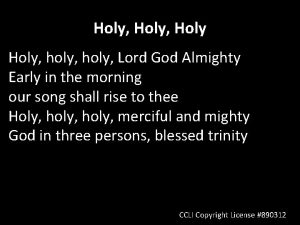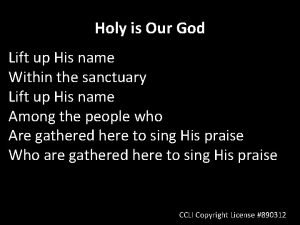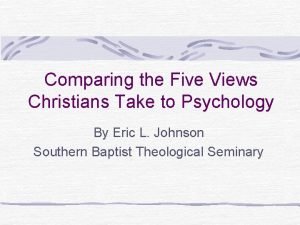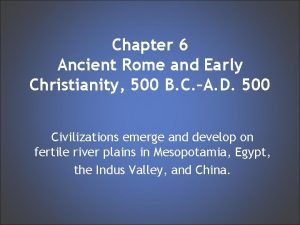Christianity and War Holy War Pacifism Just War







![Isaiah’s vision of world peace He [God] shall judge between the nations, and shall Isaiah’s vision of world peace He [God] shall judge between the nations, and shall](https://slidetodoc.com/presentation_image_h2/b2fec9eef6a0b9b55d79ae29f78cd2d7/image-8.jpg)








- Slides: 16

Christianity and War Holy War Pacifism Just War Early Christian attitudes towards war. The Life of St Martin.

Holy Wars: past & present Judaism: conquest of Canaan Islam: conquest of Mecca Christianity: crusades

Common Features of Holy Wars Absolute and unlimited goals Conflict between forces of good an forces of evil Destruction of the enemy at any cost Any means are justified No moral responsibility for

Modern ‘Total Wars’ Genocide Anti-Semitism Armenian Genocide in Turkey Extermination of non-Muslims in Sudan

Problems with Holy Wars Mistaken view of God: God does not care for my enemies Mistaken view of the world: black & white picture Lack of moral restraint Holy wars always fail to achieve their goals

Spiritualization of Holy War tradition Spiritual warfare Apocalyptic war Christ and the Army of

Pacifism It is always wrong to go to war ‘You shall not kill’ Ex. 20: 13 Words of Jesus: “Do not resist an evildoer. But if anyone strikes you on the right cheek, turn the other also. ” (Mt 5: 39) “Love your enemies and pray for those who persecute Statue in the UN you” (Mt 5: 44)
![Isaiahs vision of world peace He God shall judge between the nations and shall Isaiah’s vision of world peace He [God] shall judge between the nations, and shall](https://slidetodoc.com/presentation_image_h2/b2fec9eef6a0b9b55d79ae29f78cd2d7/image-8.jpg)
Isaiah’s vision of world peace He [God] shall judge between the nations, and shall arbitrate for many peoples; they shall beat their swords into plowshares, and their spears into pruning hooks; nation shall not lift up sword against nation, neither shall they learn war any more. Isaiah 2: 4.

Pacifism throughout history 1 -3 rd c. : Most Christians were pacifists Non-violent resistance of the martyrs Franciscans Mennonites Quakers

Arguments for Pacifism Pragmatic argument: “pacifism works” Ghandi Martin Luther King Witness argument

Strengths of Pacifism Nonviolent means are sometimes more effective Reminds that violence is costly: further alienation; human lives; financial expenses of war

Weaknesses of Pacifism Pragmatic argument is based on anecdotal evidence God does not condone sin Shallow understanding of sinfulness of human condition Christians have responsibility to protect the unjustly attacked

Just War 1. Just cause (protection from unjust 2. 3. 4. 5. 6. attack, protect rights, reestablish just political order). Legitimate authority. Last resort. Reasonable chance of success. Right goal and intention: re-establish peace. Proportionality: violence used in war must be proportional to injury suffered.

Early Christian Attitudes towards military service & war Why did most early Christians resist serving in the army? The viability of two-tiered ethics: ‘natural law’ for the society at large and the ethics of perfection for some in the Church.

Cult of the Saints Pilgrimages to holy places Intercession of the saints Veneration of relics St. Martin of Tours (d. 397).

An Episode from the Life of St Martin
 Holy holy god almighty the great i am
Holy holy god almighty the great i am You are holy lord of heaven and earth
You are holy lord of heaven and earth Strengths and weaknesses of pacifism
Strengths and weaknesses of pacifism Conditional pacifism
Conditional pacifism Qualities of the holy spirit
Qualities of the holy spirit Be holy as i am holy
Be holy as i am holy Lift up his name
Lift up his name Hol holy holy
Hol holy holy I am holy you must be holy
I am holy you must be holy Rewrite the final six lines of the play in your own words.
Rewrite the final six lines of the play in your own words. Buddhism vs christianity
Buddhism vs christianity Monotheism chart judaism christianity islam
Monotheism chart judaism christianity islam Psychology and christianity: five views
Psychology and christianity: five views Ancient rome and early christianity
Ancient rome and early christianity Islam vs. christianity venn diagram
Islam vs. christianity venn diagram Rome and the rise of christianity
Rome and the rise of christianity Big crunch
Big crunch































